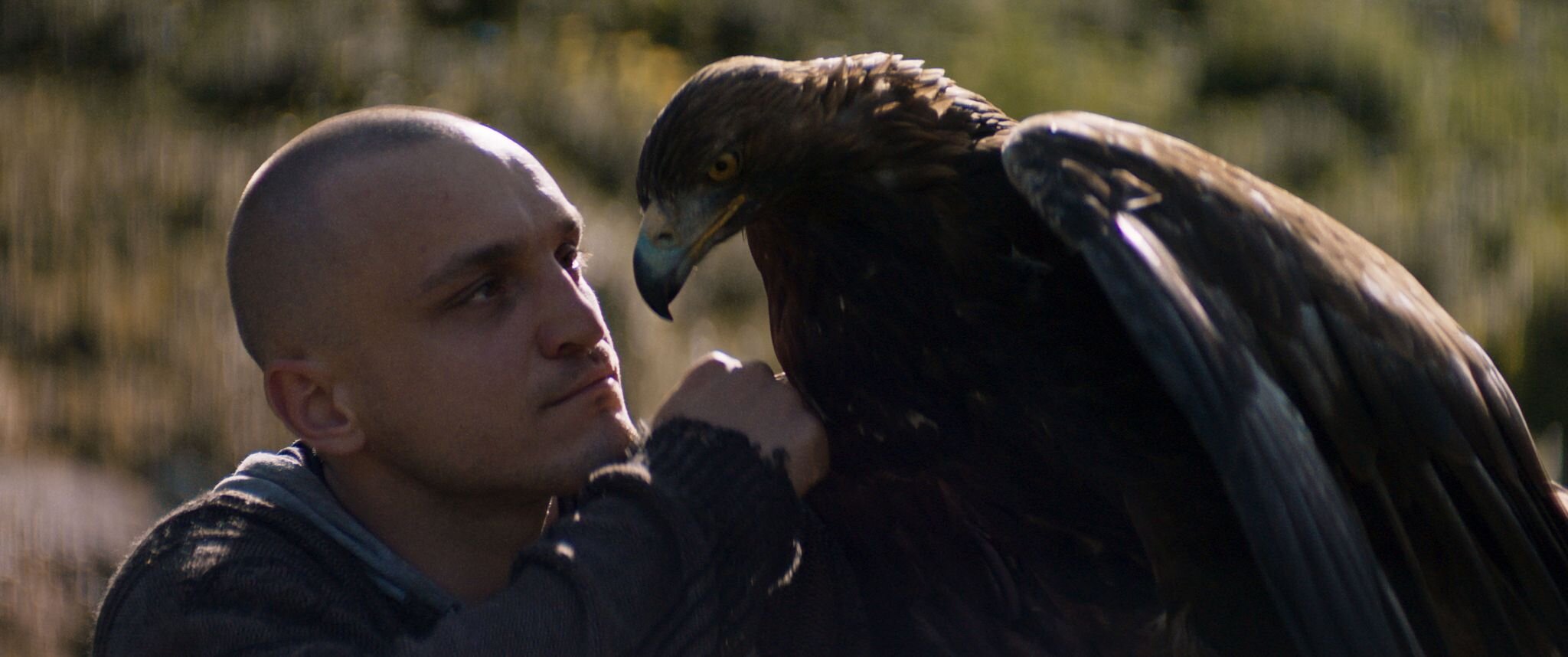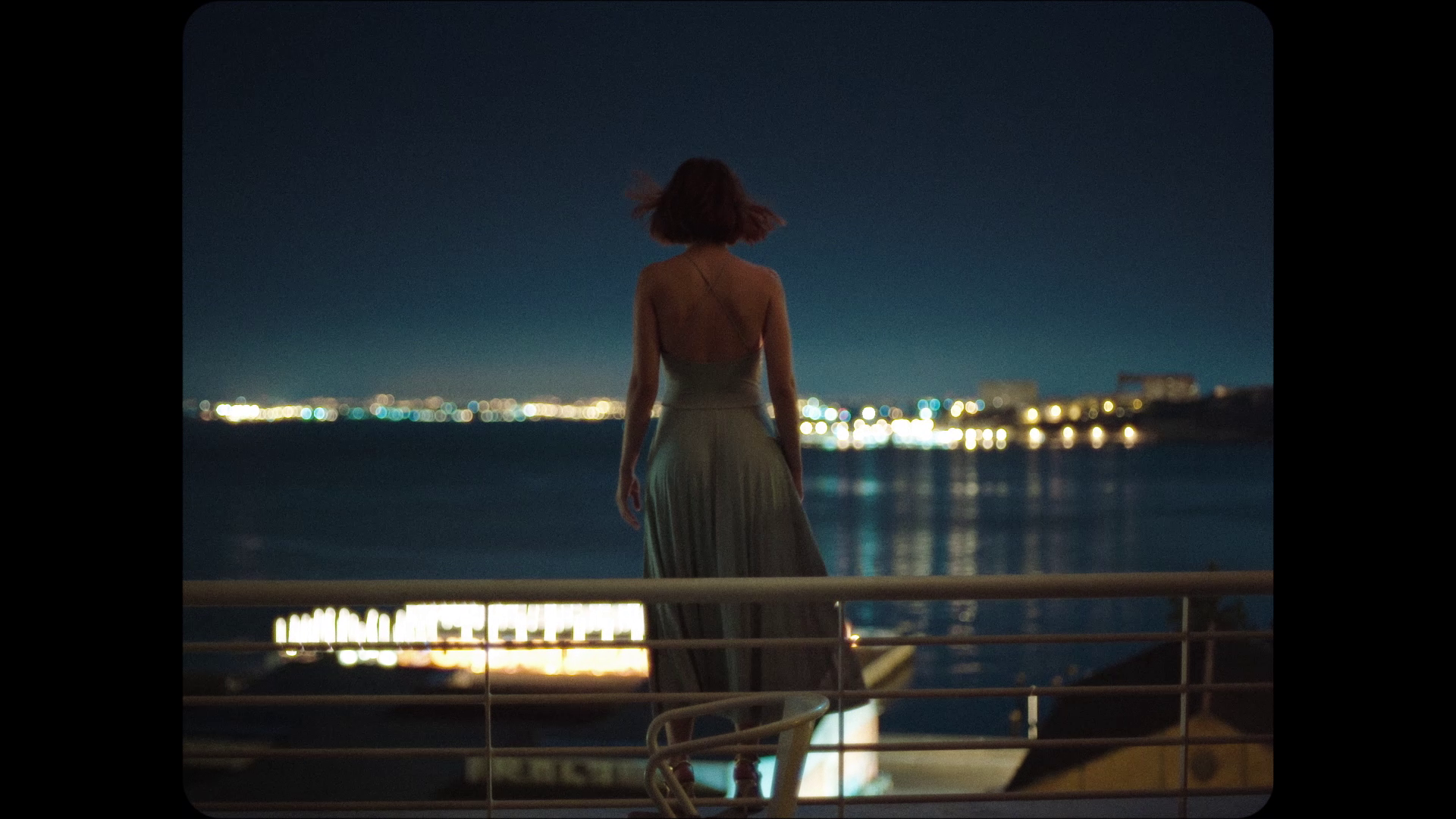[Fantastic Fest 2021 Capsule Reviews] Luzifer and Name Above Title (Um Fio de Baba Escarlate)
Religious iconography adds layers to Luzifer and Name Above Title (Um Fio de Baba Escarlate), two of the more esoteric or, dare I say, “challenging” films of Fantastic Fest 2021.
Up first is writer/director Peter Brunner’s mood piece Luzifer, which tells the tale of a mother named Maria (Susanne Jensen) and her son Johannes (Franz Rogowski). Maria is an addict and alcoholic before she was saved and brought to this land. Now, she’s clean and sober and teaches her adult son rituals only the two of them completely understand. While he’s a man, Johannes has a learning disability and the intelligence of a small child; he’s mostly illiterate and speaks in small, one word phrases like “mama, ouch” and “hole-cave.”
They live alone in the craggy peaks of a mountain, free from most of modern society, but Maria has a cell phone that constantly rings because a company wants to buy their ramshackle hut to make a ski lodge. Meanwhile, the continuous hum and buzz of chainsaws (followed by muted sounds of trees falling) stretch from the woods, threatening their idyllic existence. A gnash in the mountainous peak is referred to as a “hole-cave” or “hell” by the mostly mute Johannes.
In Luzifer, progress is the devil and it spills out of the hole-cave with buzzing drones, surveying the land and infiltrating Maria’s home. Soon it’ll be followed by flesh and blood, wanting to upset their delicate living situation. Brunner’s film takes an Edenic existence to its core: a woman and a man, both sexless and unashamed of nudity. Images of snakes hiding in trees and the ominous drones buzzing through showcase the push/pull of religious iconography and material world progress. Luzifer is a slice-of-life drama about their meager existence, intercut with horrific imagery that hint at something darker. It’s all captured by Peter Flinckenberg’s coolly-detached cameras that mimic the ice-cold feel of the craggy peaks and frigid air that surround the family unit.
Underneath the surface, supernatural elements pop up as the two pray to a figurine burnt black and stuffed inside a craggy tree and while their rituals seem paganesque, Maria has Jesus tattooed on her body and wants a church to erect a monument to her dead husband. Fans of more meditative horror and mood pieces (think Hagazussa or Sator) will find some introspective and haunting moments here. But its ominous and oppressive tone never percolates past a slow simmer. Luzifer will be someone’s favorite film from the festival circuit. It just isn’t mine.
On the other side of things, Carlos Conceição’s Name Above Title/Um Fio de Baba Escarlate might seem vastly different from Luzifer, but it’s focus on tone and mood feels paradoxically similar in approach, if not content. Conceição’s film opens with a quote from Ted Bundy and dives stylistically deep into serial killers as it also pulls from the Italian giallo subgenre. Possessing a dreamy quality, Name Above Title opens with a drunk woman (Joana Ribeiro) sloshing her way through a party until she reaches a balcony before jumping to her death. Meanwhile Candide (Mattheiu Charneau), makes out with a woman (also Joana Ribeiro) by the beach before strangling her with a phone charging cable.
Depositing her body into his trunk, he drives to a building which, coincidentally, is the building the drunk woman leapt from. She lands just as he gets out of his vehicle and he rushes to her side. A gaggle of onlookers appears, snapping photos and filming as he holds up her head, listens to the silent words she speaks and then kisses her passionately. Soon, the videos of his kiss, with titles like “Kiss Me” and “Kindness of Strangers”, hit the internet and Candide becomes an overnight sensation: a kind man who gave a dying woman her final wish. His boyishly handsome face gets photographed by talented photographers, gifts begin arriving and his schedule gets booked with meetings with designers like Balenciaga, Versace and Tom Ford. He’s hot and everyone knows it, including Candide himself, who snaps selfies of himself while the fashion photographers take their own.
Matthieu oozes charm and sex and Carlos Conceição and his cinematographer Vasco Viana capture his charming smirks and his body with an eye of male objectification that’s typically reserved for women in the films Name Above Title pulls from. It’s no mistake the film opens with a quote from Ted Bundy, a wink and a nudge to the way people have been calling the serial killer hot for years. Filmed in a 4:3 ratio and almost completely with dialogue, Name Above Title won’t be for everyone, but the way it evokes a time period and then wraps it up with the way we almost idolize the serial killer over the victim makes it a visual masterpiece of style. By casting all of the nameless victims as one woman and focusing on Candide’s rise to Jesus iconography, Conceição has crafted a 60 minute exercise in minimalism that would pair well with the more maximalist neo-giallo, The Last Matinee.


![[Fantastic Fest 2021 Capsule Reviews] Luzifer and Name Above Title (Um Fio de Baba Escarlate)](https://images.squarespace-cdn.com/content/v1/5b39608d75f9eef54c62c3f0/1632777854874-2R1MPEL73E09KV5DFP04/ULi5Xazc.png)


![[Fantastic Fest 2021 Capsule Reviews] Let the Wrong One In and Beyond the Infinite Two Minutes Bring Laughs to the Festival](https://images.squarespace-cdn.com/content/v1/5b39608d75f9eef54c62c3f0/1632778110664-Z73PYFJFMCG4MA1M4USP/Ud4XGU3w.jpeg)
![[Fantastic Fest 2021 Review] There's Someone Inside Your House Needed a Better Script](https://images.squarespace-cdn.com/content/v1/5b39608d75f9eef54c62c3f0/1632777538371-F8YST4YS5ZJTNP3A0K8B/TSIYH_Main_Vertical_27x40_RGB_RO.jpg)
![[Fantastic Fest 2023 Capsule Reviews] 'Mushrooms' 'A Guide to Becoming an Elm Tree' and 'Falling Stars'](https://images.squarespace-cdn.com/content/v1/5b39608d75f9eef54c62c3f0/1696513925771-CYPTLFLDRNPINHBOB2SQ/GUIDE_TO_BECOMING_AN_ELM_TREE_4PRESS.jpg)